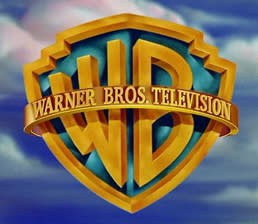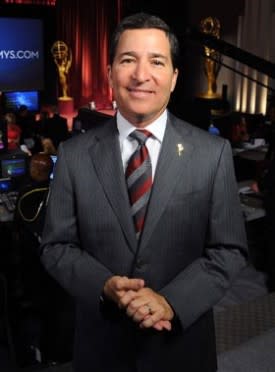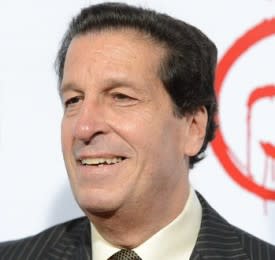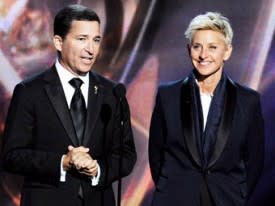EXCLUSIVE: Warner Bros TV Shake-Up – Top Exec Bruce Rosenblum Settled Out And Peter Roth Signed To Big Long-Term Deal; All The Behind-The-Scenes Drama & Detail
UPDATE SUNDAY 2 PM: Warner Bros Entertainment CEO Kevin Tsujihara is finally confirming internally my news that Warner Bros Television Group Bruce Rosenblum is exiting. This, after Tsujihara for months and even in recent weeks has told almost everyone there that Rosenblum was staying.
BREAKING … SATURDAY 10 PM… EXCLUSIVE: Hollywood always fires people in success, or so the saying goes. I’ve learned that the announcement by Warner Bros Entertainment CEO (and soon-to-be-chairman) Kevin Tsujihara is planned for 7 to 14 days after next week’s TV upfront presentations. Despite Tsujihara’s claims for months that he hadn’t made up his mind what to do about the brilliant but sharp-elbowed Bruce Rosenblum, I can tell you Tsujihara declared from Day One of his new job that “Bruce is an unnecessary layer of management”. This, even though Rosenblum’s Warner Bros Television Group consistently contributes half of Warner Bros Entertainment’s profits year after year. I’m told that Rosenblum won’t be replaced as President of the Warner Bros Television Group now that he’s quietly settled out his contract which expires in August. (Tsujihara never made a move to negotiate a new one for him.) Some already expect Rosenblum not to turn up at next week’s upfronts. Instead Bruce is sitting on a fat severance package in recognition of his more than two outstanding decades at Warner Bros and for keeping his mouth shut during the humiliation of losing the WB CEO job and then getting kicked to the curb on top of that. Many in Hollywood thought Tsujihara might keep Rosenblum in place rather than bust up what is so obviously a winning formula atop the TV group. Instead Tsujihara proved that, just like his Time Warner boss Jeff Bewkes, he is more obsessed by politics and personality than profit. (“It would have been pretty awkward, quite frankly,” Tsujihara told the TV community about keeping Rosenblum on.)
Warner Bros Television President Peter Roth has just been signed to a new long-term deal and will report to Tsujihara for the first time. Roth reps the increasing power of content and the executives directly responsible for its creation. ”As I look at the key people that exist, Peter comes at the top of the list. He’s at the top of the game right now creatively,” Tsujihara enthused privately on Day One of his new job. But Rosenblum’s roles will be assumed by a new WBTV leadership mix including Warner Bros TV Group EVP Craig Hunegs, Warner Bros International Distribution President Jeffrey Schlesinger, and Warner Bros Television EVP Brett Paul. (“Peter is the big teddy bear but Brent was sent in to beat you up,” notes one exec.) These guys are some of what Bewkes was referring to back on January 28th when he talked about the “very strong benches of people beneath”. All will become the TV group’s new sharp-elbowed negotiators who won’t rub people the wrong way like Rosenblum did.
It’s been a professional and emotional roller-coaster for Rosenblum ever since he expected the top job and didn’t get it. Conventional wisdom was that Rosenblum, who took over the TV group in 2005 the same year that Tsujihara took over Home Entertainment, had a near lock on the job — especially if Bewkes decided not to go outside. And an appointment of Rosenblum would have continued TV leadership atop Warner Bros – i.e. Barry Meyer, who still comes to work every day – and not been questioned. In fact, Bruce learned the bad news from Barry on the Saturday before that Monday morning announcement, and immediately choked back tears. Rosenblum took the next couple of days off after releasing this statement: “Obviously, I’m disappointed, who wouldn’t be? Warner Bros is a unique and special place and I know it will be in good hands with Kevin at the helm. I continue to be proud of our accomplishments and I have the most respect and admiration for our amazing team at the studio — a team that is thriving in an ever-transforming business.”
As a pal explained, ”He needed some space. I don’t think he’s ever faced a loss. It was the first real sock in the stomach in his career. Until then it had been up and up and up for him.” Few, least of all Bruce, expected Bewkes to take “the path of least resistance and go with the consensus candidate” - not nearly as successful Tsujihara. In fact, most of Warner Bros long ago dubbed Tsujihara the ‘Yes Man’ and got the name from that movie where Jim Carrey always says yes. Explains an insider: ”Kevin was chosen as much for his temperament as his skill set which is no match with Bruce’s. But Bewkes likes people who don’t make waves — and Bruce makes waves.”
What sank Rosenblum’s chances was the perception that he’d campaigned too hard and too publicly for the job even to the point of acting like it was already his. As a network topper tells me, “It was his to lose and he lost it when he overplayed his hand by being too presumptive and too transparent how he was politicking for the job.” But a pal explains, ”Bruce is swagger more than arrogance. Barry loved him, though, and fought for a time to give the top job to Bruce, and then to Bruce and Kevin together.” One reason Rosenblum ran for the Academy Of Television Arts & Sciences’ top post of Chairman/CEO was to show not just the TV community but also Warner Bros that he could be a statesman and visionary and not just the dollar-and-cents asshole. ”The good news about Bruce is he’s very smart and he’s very aggressive. Sometimes aggressive is a fine line,” one network exec tells me. But it was Rosenblum’s job to squeeze every deal and gain every advantage - often by threats and intimidation, always using the leverage of Warner Bros as a big badass that wouldn’t think twice about taking a show to another network. The TV community still talks about Rosenblum’s recent hardball tactics this winter with the core NBC station group on that renewal deal for Ellen DeGeneres’ syndicated daytime talk show through the 2016-2017 season. ”Bruce would maximize the money for the company until you’d squeal like a pig,” one exec laughs.
Roth oversees production of network and cable series (scripted, reality and animation). Bruce oversea the entire portfolio of television businesses, including worldwide production, traditional and digital distribution globally, and broadcasting. He devised the entire strategy: determining money spent, distribution windows, streaming platforms in season, out of season, and scenarios globally. ”These are certainly skills that Warner Bros will miss. Don’t get me wrong: Schlesinger is first rate, and Hudgenz is solid, and Paul is Peter’s trusted henchman. But Bruce is a big part of that team. Every creative decision is also a business decision. You need the yin and yang. Without Bruce there will be a difference. He will be missed.”
Even Rosenblum’s wife has advised him to sit out the summer and think about what he wants to do next. In February, March, and April he was actively taking meetings – studios, networks, even agencies and Silicon Valley. He doesn’t want to move to NY for the big Hearst job now vacant because of Scott Sassa’s sexting scandal. It appears Rosenblum has not lined up another gig yet. “I’m not hearing that there’s anything else out there more attractive. So I expected him to try to stay on,” one source says. Now insiders tell me that Rosenblum is going to turn extrepreneurial. Who wouldn’t invest in him?
Rosenblum started out as an entertainment attorney and business affairs executive before climbing the ladder at Warner Bros, which he joined in 1989 as part of Warner Communications’ acquisition of Lorimar Telepictures. In his current position since 2005, Rosenblum focused largely on the distribution of the company’s product, domestically and internationally. The only major production area that does not fall under Roth at the moment is first-run syndication division Telepictures Prods. Rosenblum’s duties also included overseeing Warner Bros Entertainment’s interest in The CW, a co-venture with CBS. (It was Rosenblum who installed at the helm his not-very successful pal Mark Pedowitz.) Despite not being affiliated with a major broadcast network, Warner Bros and its roster of powerhouse hyphenates like Chuck Lorre, J.J. Abrams, Jerry Bruckheimer, and John Wells, is one of the top sellers of content. It has the two highest-priced off-network comedy series, 2 Broke Girls and The Big Bang Theory, and one of the top-selling off-network dramas, The Mentalist. Warner Bros TV had the two breakouts this past fall with NBC’s Revolution and the CW’s Arrow. The studio via its cable/reality division Warner Horizon also produces the hottest broadcast reality series at the moment, NBC’s The Voice. Warner Bros TV also is a big supplier to siblings TNT, TBS and the CW. It produced TNT’s flagship series The Closer and its spinoff Major Crimes as well as Rizzoli & Isles. It produces the CW’s two highest rated series The Vampire Diaries and Arrow, and behind the TBS sitcom Sullivan And Son. During the 2012–2013 season, the Warner Bros Television Group produced some 50 primetime, first-run, cable and animated series and has been the leading supplier to the broadcast networks for 21 out of the last 26 years, supplying to all five of the U.S. broadcast networks.
Bewkes destabilized all of Warner Bros in a big way with his shockingly unexpected announcement that Tsujihara would take over Warner Bros on March 1. Now we know what’s happened at WBTV. The next question is what happens to Warner Bros Film Group topper Jeff Robinov: can he stay or must he go? More on that later…
Related stories
Jeff Bewkes Says Pay TV Providers Have No Reason To Fear Cord Cutting
Jeff Bewkes Lauds Kevin Tsujihara, And Warner Bros’ Prospects
Get more from Deadline.com: Follow us on Twitter, Facebook, Newsletter




